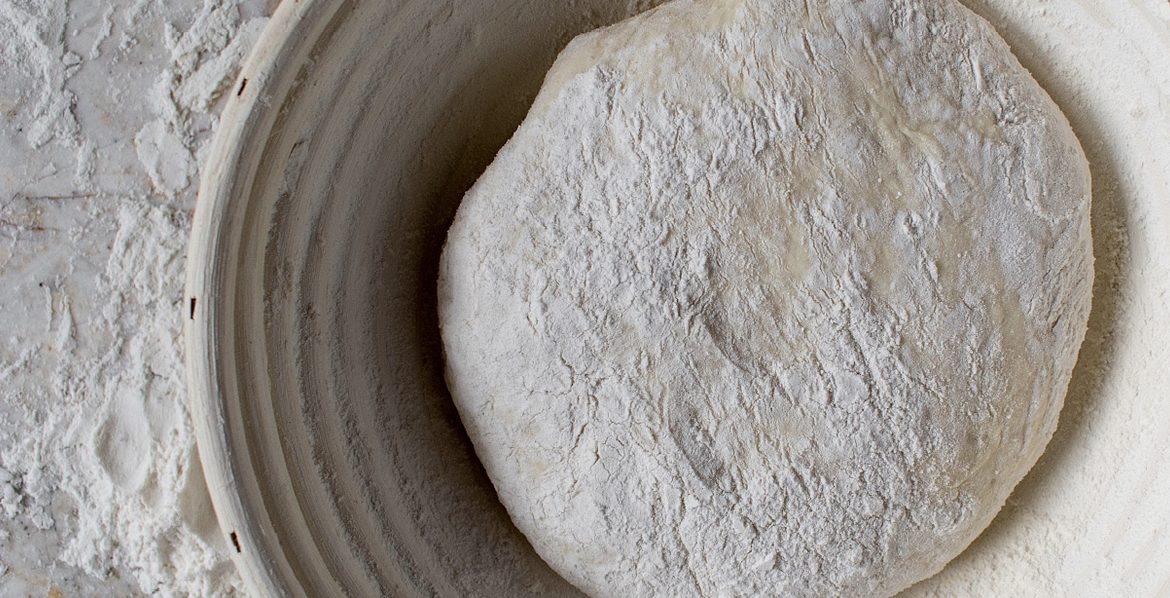
![]()
Think back to the early days of the Covid-19 pandemic and you’ll likely recall a few food trends. First, we regrew our scallions—a miraculous, hopeful feat. Then, we baked our own vegetable-bedazzled focaccias—a Decameron-style artistic project that came, saw and conquered all of Instagram. And then, finally, we experimented with making our own sourdough starters—an ambitious baking-project-cum-science-experiment that saw so many amateur bakers turning out gorgeous, artisanal loafs.
But of these three trends, our obsession with sourdough is the only one really sticking around. Why? Because—for starters (get it?)—of its history, its flavor, and its health benefits.
The oldest incarnation of leavened bread—that is, bread that rises due to yeast or other ingredients—sourdough was baked and enjoyed in ancient Egypt. According to NPR, it was “probably discovered by accident when bread dough was left out and good microorganisms—wild yeast—drifted into the mix.” It was a happy accident, producing bread with a lighter texture and better taste than ever before.
Sourdough’s characteristic taste and texture—delightfully toothsome with a crispy, crunchy crust—catapulted the bread to its long standing popularity and use.

Slowly fermented without the use of commercial yeast, sourdough offers a range of health benefits, as well. Besides being chock full of antioxidants that can lower the risk for certain types of cancer, sourdough is easily digestible thanks to its long fermentation process that begins breaking down the bread’s starches long before you take your first bite. Additionally, sourdough is an excellent source of good bacteria, lactic acid and a range of vitamins and minerals including iron, calcium, zinc, potassium, and more.
Compared with most supermarket loaves, sourdough is truly in a class of its own—which is why Europastry, the Barcelona-based leader in bakery products, has been turning to sourdough, and the traditions of the master artisans who make it, for over 30 years.
Offering products and expertise in the baking world in more than 80 countries worldwide through their 22 plants and 27 sales offices, Europastry is perhaps best known for two of their beloved products: their Brioche and Cristal bread.
Made, like sourdough, using a longer fermentation process with real butter and cage-free eggs, Europastry’s brioche is beloved for good reason. With a golden, glossy crust and a sweet, super tender, almost melt-in-your-mouth crumb, Europastry’s brioche—made by the company’s Euroclassic line—is a revelation. It is also made sustainably with all natural ingredients, and without any preservatives, artificial flavors or colors.

Europastry’s Cristal bread is produced in a similarly sustainable, Mediterranean, and health-conscious style, using just flour, water, sourdough starter and olive oil. Developed in Barcelona in 2014, Cristal is a lighter, tastier alternative to hamburger buns with higher-than-usual hydration levels. The end result, thanks to its 80% hydration ratio, is a bread that is easier to digest, soft and spongy, and 100% vegan. Sign us up!
So while the reality of the pandemic has changed and so, too, have the food trends that sprung up around it, it is excellent to see that sourdough, true to its history, continues to prevail—and is, in fact, actually more accessible than ever thanks to a company like Europastry, who brings it so beautifully to our shelves.
For more on Europastry, or for help locating their products, please visit their website.



